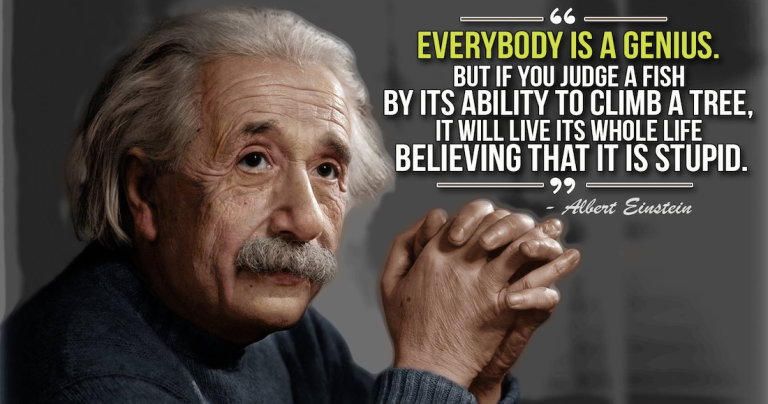
Exploring the origins and implications of a popular quote falsely attributed to Albert Einstein on individual strengths and societal judgments.

New York, N.Y. – In the vast ocean of inspirational quotes that flood social media feeds and motivational posters, few resonate as deeply as this one: “Everybody is a genius. But if you judge a fish by its ability to climb a tree, it will live its whole life believing that it is stupid.”
Attributed widely to Albert Einstein, the statement captures a profound truth about human potential and the pitfalls of uniform judgment. Yet, as research reveals, Einstein never uttered these words. The quote’s origins lie in a rich tapestry of educational allegories dating back over a century, and its misattribution only amplifies its ironic wisdom. Despite lacking a famous pedigree, the saying’s message endures, challenging modern societies to rethink how they evaluate intelligence, talent, and success.
This feature delves into the quote’s shadowy history, unpacks why it clings to Einstein’s legacy, and examines its applications in contemporary fields like education and neurodiversity. In an era where standardized testing and rigid career paths dominate, the fish-and-tree metaphor serves as a poignant reminder: true genius flourishes when nurtured in its natural element.
The Myth of Einstein’s Attribution
The quote first gained traction in its modern form around the early 2000s, often paired with Albert Einstein’s image in memes and self-help books. A 2021 fact-check by USA Today confirmed that no archival evidence links the words to the physicist, who died on April 18, 1955. Comprehensive collections like “The Ultimate Quotable Einstein,” published by Princeton University Press, omit it entirely. So, how did this association emerge?

Investigations trace the earliest printed attribution to Einstein to 2004, in Matthew Kelly’s book “The Rhythm of Life: Living Every Day with Passion and Purpose.” Kelly presented it as a direct quote from the scientist, but without sourcing.
This single instance appears to have sparked a viral spread, amplified by the Internet’s echo chambers. As one skeptic noted on Stack Exchange, the quote’s philosophical bent aligns with Einstein’s known views on creativity and education—he once criticized schools for killing curiosity—but the language and structure do not match his documented writings.
Misattributions like this are common in the world of quotations. History.com lists several falsehoods pinned on Einstein, including remarks on bees and insanity, often because his name lends instant credibility. In this case, the fish-tree analogy taps into Einstein’s reputation as a nonconformist genius who struggled in traditional schooling.
Born in Ulm, Germany, on March 14, 1879, Einstein famously rebelled against rote learning, once calling it “the murder of the holy curiosity of inquiry.” Yet, the quote’s true roots predate him by decades, evolving from satirical fables about education systems.
Tracing the Historical Roots
The essence of the quote—an allegory critiquing one-size-fits-all judgments—can be traced to the late 19th century. According to Quote Investigator, the earliest precursor appeared in 1898, in an essay titled “An Educational Allegory” by Amos E. Dolbear, a physicist and inventor writing under the pseudonym “Aesop, Jr.” Published in the Journal of Education, the piece described a fantastical school where animals were forced to master skills alien to their natures: birds had to run, fish to fly, and squirrels to swim.

Dolbear’s satire targeted the rigid curricula of the time, arguing that uniform standards stifle innate talents. “The animals had been educated to believe that the only true education was that which developed all their powers equally,” he wrote, highlighting the absurdity.
This allegory resurfaced in various forms: a 1903 newspaper fable about a “Jungle School Board” where creatures bickered over curriculum, and a 1946 version in the Boston Herald adding more animals, like a squirrel complaining about mandatory swimming.
By the mid-20th century, the narrative had crystallized around the fish and tree motif. A 1967 letter to the editor in the Rockford Morning Star echoed similar sentiments without attribution. The full modern phrasing—“Everybody is a genius…”—emerged in Kelly’s 2004 book, blending the old allegory with a positive affirmation of universal potential.
Quote Investigator notes that while elements like “everybody is a genius” appeared earlier (e.g., in a 1974 interview with dancer Martha Graham attributing it to composer Edgar Varèse), the combination is recent.
These evolutions reflect broader societal shifts. In the industrial age, education emphasized conformity to prepare workers for factories. Dolbear’s era saw the rise of compulsory schooling in the U.S., often criticized for ignoring individual differences.
The quote’s unattributable nature—much like urban legends—allows it to adapt, gaining relevance in new contexts without a fixed author.
Applications in Modern Education
Today, the fish-tree metaphor is a staple in discussions about educational reform, particularly the need for differentiation. In a 2019 blog post, educator Steve Wheeler argued that forcing all students to “climb that tree” ignores diverse learning styles, leading to disengagement and low self-esteem.

Standardized tests, like the SAT or PISA assessments, exemplify this: they measure a narrow set of skills, such as logical reasoning and memorization, often disadvantaging creative or kinesthetic learners.
Consider the case of dyslexia, a neurodevelopmental condition affecting up to 20% of the population.
The book “Fish Don’t Climb Trees” by Sue Blyth reframes dyslexia not as a deficit but as a different way of processing information, urging educators to celebrate strengths like visual thinking and problem-solving.
Similarly, Lynda Mullaly Hunt’s young adult novel Fish in a Tree, published in 2015, follows Ally, a girl with dyslexia who feels “stupid” in school until a teacher recognizes her artistic talents.
The book has sold over a million copies and is used in classrooms to promote empathy and neurodiversity.
In higher education, the quote inspires calls for personalized learning.
A 2023 article on medical education at the University of Vermont questioned traditional lecture-based models, suggesting they judge future doctors by memorization rather than clinical intuition or empathy.
With remote learning surging post-COVID-19, tools like adaptive software allow students to progress at their own pace, embodying the quote’s ethos.
Yet, challenges persist. In the U.S., where public schools serve over 50 million students, resource constraints often lead to homogenized teaching.
Critics argue that without systemic change—such as smaller class sizes or teacher training in differentiated instruction—the fish will continue struggling up trees.

Embracing Neurodiversity and Beyond
The quote’s wisdom extends beyond classrooms into neurodiversity advocacy. Coined in the 1990s by sociologist Judy Singer, neurodiversity views conditions like autism, ADHD, and dyslexia as natural variations rather than disorders.

A LinkedIn post from the BBC in 2016 used the fish-tree analogy to promote workplace inclusion, noting that judging neurodivergent individuals by neurotypical standards wastes talent.
For instance, people with ADHD often excel in dynamic environments requiring hyperfocus and creativity, yet traditional offices emphasize sustained attention—akin to asking a fish to climb.
Reddit discussions in neurodiversity communities frequently invoke the quote to combat stigma, with users sharing stories of feeling “stupid” in school only to thrive in entrepreneurship or arts.
In the corporate world, companies like Microsoft and SAP have launched neurodiversity hiring programs, recognizing that diverse cognitive profiles drive innovation.
A 2023 study found that teams with neurodivergent members solved problems 30% faster in certain tasks. The quote underscores this: by valuing the fish’s swimming prowess, societies unlock untapped potential.
Even in personal development, the metaphor encourages self-compassion.
Wellness coach Sarah Weaver, in a 2023 blog, advised parents of neurodivergent children
to nurture innate abilities rather than force conformity, fostering authenticity and resilience.
The Astonishing Truth Persists
Though unattributable to Einstein, the quote’s truth astonishes in its simplicity and universality. It challenges entrenched systems—from education to employment—to adapt to individual strengths, promoting equity and fulfillment. As global challenges like climate change demand diverse thinkers, ignoring this wisdom risks leaving geniuses believing they are stupid.
In New York City’s bustling melting pot, where immigrants and innovators converge, the message rings especially true. Here, amid skyscrapers that no fish could climb, human potential swims in myriad forms, waiting to be recognized.
Summary
Although often misattributed to Albert Einstein, the quote about judging a fish by its tree-climbing ability stems from 19th-century educational allegories critiquing uniform standards. This feature explores its historical evolution, from Amos Dolbear’s 1898 satire to modern applications in differentiated learning and neurodiversity advocacy. It highlights how embracing individual strengths can transform education and society, preventing talented individuals from feeling inadequate in mismatched environments. (75 words)
#MisattributedQuotes #EinsteinMyth #Neurodiversity #EducationReform #IndividualStrengths
TAGS: Einstein, quotes, education, neurodiversity, dyslexia, differentiation, allegories, genius, potential, diversity
